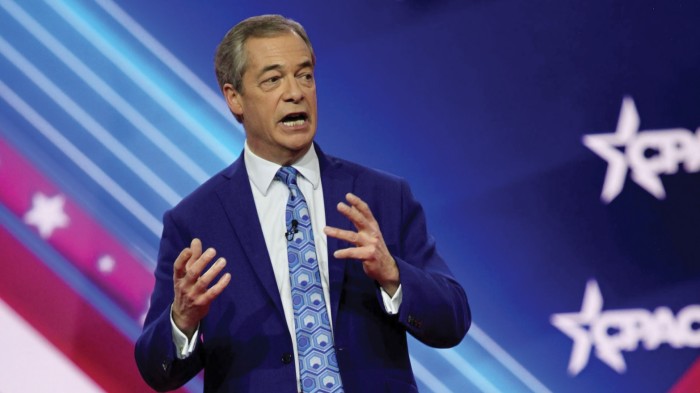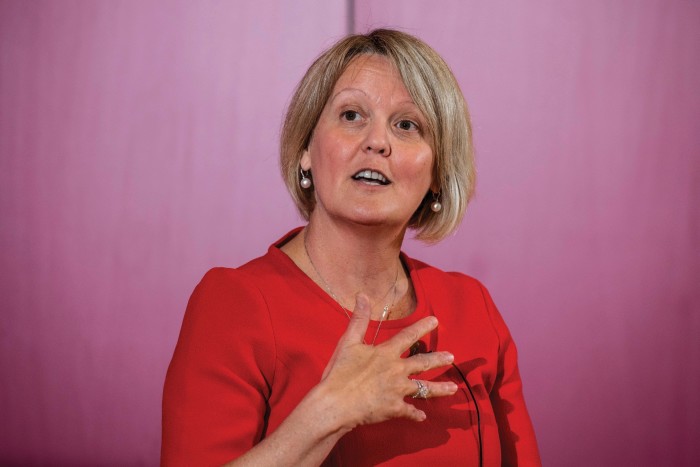What Farage vs Coutts tells us about clashes over companies’ values

Roula Khalaf, Editor of the FT, selects her favourite stories in this weekly newsletter.
In the latest in a series of business-school-style teaching case studies, Professor André Spicer looks at the fallout from Coutts’ decision to close Nigel Farage’s bank account and what it reveals about collisions between companies’ and customers’ values. After reading the article, consider the questions raised.
In June 2023, Nigel Farage — the rightwing British politician and television presenter — appeared on his regular show on GB News. He described how he had been contacted by his bank and told it planned to close his business and personal accounts. Farage emailed its chairman and was told the decision was made on purely commercial grounds. He claimed instead the reason was “political”.
The next day, Farage wrote an opinion article in The Daily Telegraph describing how Britain’s major corporations had “turned woke”. He warned his readers:
“If you were to post a political opinion on social media that did not conform to your bank’s ‘values’, you could find yourself in my position.”
A few days after he shared his views, Alison Rose, chief executive of NatWest banking group, the parent company of Farage’s bank, Coutts, was enjoying a charity dinner hosted at the Langham Hotel in central London. Rose was at the peak of her career, appointed in 2019 to the role after a 30-year career at the bank. Since taking it on, she had been striving to make NatWest purpose-driven. She wanted it to be an “open, inclusive, and progressive organisation”.
During the dinner at the Langham, Rose was seated next to Simon Jack, a BBC business journalist. He asked her about Farage’s problems and she repeated the publicly stated view that the decision to close his accounts had been purely commercial and pointed Jack towards information on NatWest’s website on these commercial criteria.

The next day, Jack published an article stating that Coutts had taken a “commercial” decision and closed Farage’s accounts. Coutts, known as “the Queen’s bank”, has a storied history with customers among the British and global elite.
A few weeks later, Farage was back in the media again, having acquired a 40-page memo on the decision to close his accounts. It stated that Coutts’ Wealth Reputational Risk Committee “did not think continuing to bank NF [Nigel Farage] was compatible with Coutts given his publicly stated views that were at odds with our position as an inclusive organisation. This was not a political decision but one centred around inclusivity and purpose”. It recommended that “we should set a glide path to exiting NF when [his] mortgage expires”.
Following the release of the memo, Rose came under intense pressure. A former cabinet minister asked if she would be resigning, and another senior conservative MP claimed her position was untenable. Rose herself released a statement apologising for her “deeply inappropriate” statements about Farage, and stated: “I believe very strongly that freedom of expression and access to banking are fundamental to our society”.
Over the next few days, pressure continued to mount. Farage claimed Rose had falsely represented the decision to close his accounts as purely commercial. He said she had broken client confidentially by speaking with a BBC journalist about his accounts. Farage called on Rose as well as Peter Flavel (the chief executive of Coutts) and Howard Davies (the chair of NatWest) to resign.
Late into the night of July 25, the NatWest board convened for a conference call about Rose’s leadership of the bank. It eventually agreed to ask Rose to step down. The decisive factor appeared to be that the prime minister and the Treasury no longer supported her — which was destabilising given that the UK government is the largest single shareholder in the bank. Rose tendered her resignation early the following morning. The day after that Flavel resigned, saying he held the ultimate responsibility for the handling of Farage’s account.
An investigation by a law firm later found that, although the decision to close the accounts was primarily for commercial reasons, it failed to properly communicate the decision and mishandled the complaint.
The closure of the account had longer lasting implications for NatWest: it sparked a significant change of leadership and has tarnished its reputation among consumers and other stakeholders. This reputational damage may have undermined analysts’ views of the bank. When NatWest missed profit targets in the autumn, its share price fell 18 per cent before recovering to trade down 10 per cent — still its worst daily fall since the Brexit vote.

The episode has similarities to other cases where CEOs have tried to follow their corporate purpose and values, but alienated consumers. For instance, the US brewer Anheuser-Busch ran an advert for Bud Light featuring a transgender social-media influencer. This appealed to some consumers but sparked a backlash among others, and the beer lost its status as the US bestseller.
A recent article by academics from Sydney’s Macquarie Business School and Adelaide University Department of Marketing and Management, titled “Woke brand activism authenticity or the lack of it”, suggests that companies trying to convince their customers they care deeply about a wider social purpose can face significant challenges.
The first is to show that businesses are authentic about their political commitments, and that their corporate purpose is more than just marketing. A second challenge is when corporate purpose clashes with the values of some groups of customers. This is the challenge that brought down Alison Rose.
Questions raised
What can a company do if its purpose and values clash with the public statements of high-profile customers? Should Coutts have kept Farage as a customer or was it right in seeking to close his accounts once he no longer met their commercial criteria?
How should Coutts have communicated its decision to close Farage’s accounts?
Was Alison Rose’s resignation justified? What could she have done differently?
André Spicer is dean and professor of organisational behaviour at Bayes Business School, City University, London

Comments